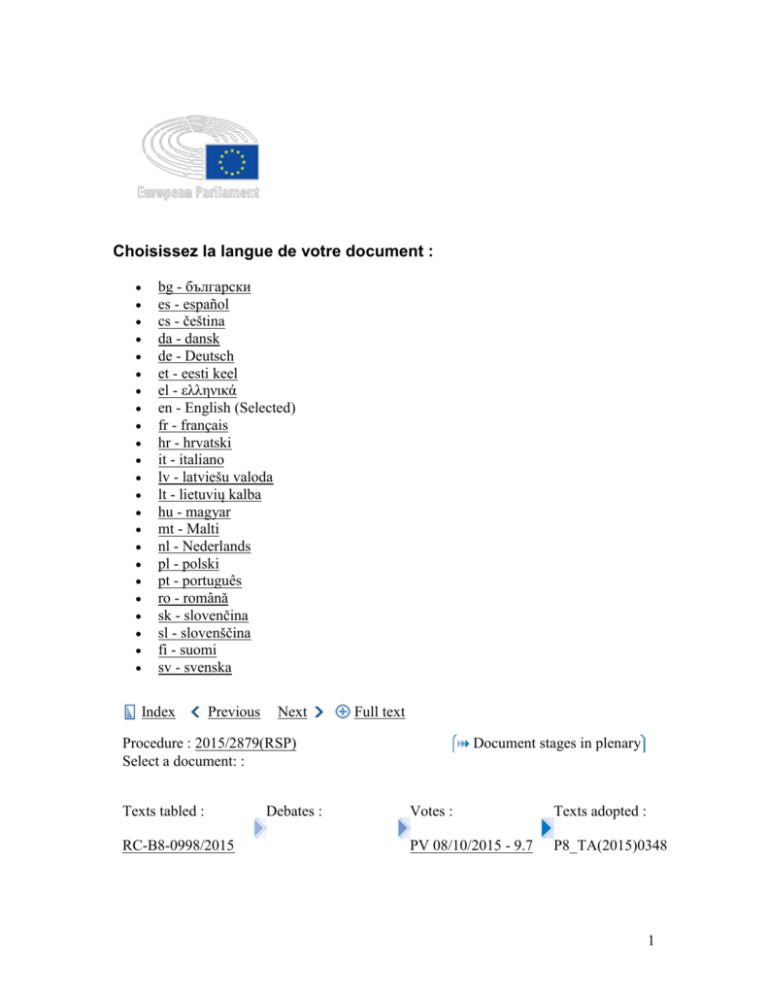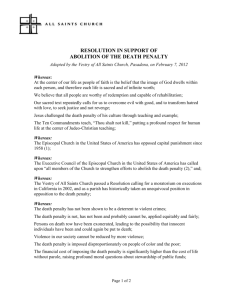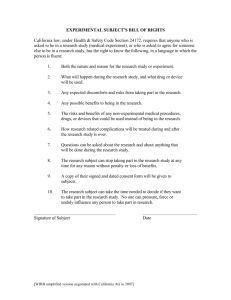English - Europeanrights.eu
advertisement

Choisissez la langue de votre document : bg - български es - español cs - čeština da - dansk de - Deutsch et - eesti keel el - ελληνικά en - English (Selected) fr - français hr - hrvatski it - italiano lv - latviešu valoda lt - lietuvių kalba hu - magyar mt - Malti nl - Nederlands pl - polski pt - português ro - română sk - slovenčina sl - slovenščina fi - suomi sv - svenska Index Previous Next Full text Procedure : 2015/2879(RSP) Select a document: : Texts tabled : RC-B8-0998/2015 Debates : Document stages in plenary Votes : Texts adopted : PV 08/10/2015 - 9.7 P8_TA(2015)0348 1 Texts adopted 178k Thursday, 8 October 2015 Strasbourg The death penalty Provisional edition P8_TA-PROV(2015)0348 B8-0998, 0999, 1001, 1006, 1007 and 1008/2015 European Parliament resolution of 8 October 2015 on the death penalty (2015/2879(RSP)) The European Parliament, – having regard to its previous resolutions on the abolition of the death penalty, in particular that of 7 October 2010(1) , – having regard to the joint declaration of 10 October 2014 by Federica Mogherini, VicePresident of the Commission/High Representative of the Union for Foreign Affairs and Security Policy, and Thorbjørn Jagland, Secretary General of the Council of Europe, on the European and World Day Against the Death Penalty, – having regard to Protocols 6 and 13 to the European Convention on Human Rights, – having regard to Article 2 of the Charter of Fundamental Rights of the European Union, – having regard to the EU Guidelines on the Death Penalty, – having regard to the EU export controls regime for goods that can be used for the death penalty, which is currently being updated, – having regard to the International Covenant on Civil and Political Rights (ICCPR) and the Second Optional Protocol thereto, – having regard to the 1984 UN Convention against Torture and Other Cruel, Inhuman or Degrading Treatment or Punishment, – having regard to the Study on the impact of the world drug problem on the enjoyment of human rights, issued by the UN High Commissioner for Human Rights in September 2015, – having regard to the resolutions of the UN General Assembly, in particular that of 18 December 2014 on the moratorium on the use of the death penalty (A/RES/69/186), – having regard to the final declaration adopted by the 5th World Congress against the 2 Death Penalty held in Madrid on 12-15 June 2013, – having regard to the World Day and the European Day against the Death Penalty, held on 10 October each year, – having regard to Rules 128(5) and 123(4) of its Rules of Procedure, A. whereas abolition of the death penalty worldwide is one of the main objectives of the EU’s human rights policy; B. whereas the focus of the World Day Against the Death Penalty on 10 October 2015 is ‘raising awareness around the application of the death penalty for drug-related offences’; C. whereas according to the UN Office of the High Commissioner for Human Rights more than 160 UN Members States, with a variety of legal systems, traditions, cultures and religious backgrounds, have either abolished the death penalty or do not practise it; D. whereas the latest figures reveal that at least 2 466 people in 55 countries are known to have been sentenced to death in 2014 – an increase of almost 23 % on the 2013 figure; whereas at least 607 executions were carried out worldwide in 2014; whereas these figures do not include the number of people believed to have been executed in China, which continued to execute more people than the rest of the world combined, while sentencing thousands more to death; whereas death sentences and executions are continuing at an alarming rate in 2015; whereas the increase in death sentences is closely linked to court rulings in mass trials in response to terrorism-related offences in countries such as Egypt and Nigeria; whereas the possible reintroduction of the death penalty is being considered in Chad and Tunisia; whereas death sentences continue to be handed down and executed in certain states in the USA; E. whereas people are reported to have been sentenced to death by stoning in Pakistan, Nigeria, Afghanistan, Iran, Iraq, Sudan, Somalia and Saudi Arabia, and whereas hundreds of women have been stoned to death for adultery in recent years; whereas stoning as a method of capital punishment is considered a form of torture; F. whereas eight states have the death penalty in their legislation for homosexuality (Mauritania, Sudan, Iran, Saudi Arabia, Yemen, Pakistan, Afghanistan and Qatar), and whereas provinces of Nigeria and Somalia officially implement death penalty for same-sex sexual acts; G. whereas the death penalty is often used against the underprivileged, the mentally ill and members of national and cultural minorities; H. whereas 33 states apply the death penalty for drug-related offences, resulting in approximately 1 000 executions annually; whereas in 2015, executions for such crimes are known to have been carried out in China, Iran, Indonesia and Saudi Arabia; whereas in 3 2015 death sentences continued to be imposed for drug-related offences in China, Indonesia, Iran, Kuwait, Malaysia, Saudi Arabia, Sri Lanka, United Arab Emirates and Vietnam; whereas these offences may include different charges of drug trafficking or drug possession; I. whereas the last 12 months have seen a global resurgence in the use of the death penalty for drug offences, with a number of states executing people for drug-related offences at a significantly increased rate, seeking to re-introduce the death penalty for drug offences, or ending long-standing death penalty moratoriums; J. whereas Iran reportedly executed 394 drug offenders in the first six months of 2015, compared with 367 in the whole of 2014; whereas half of all executions carried out in Saudi Arabia this year have been for drug offences, compared with only 4 % of the overall number in 2010; whereas at least 112 drug offenders are awaiting execution on Pakistan’s death row; K. whereas a number of citizens of EU Member States have either been executed or are awaiting execution in third countries for drug-related crimes; L. whereas Article 6(2) of the International Covenant on Civil and Political Rights stipulates that the death penalty may only be applied for the ‘most serious crimes’; whereas the UN Human Rights Committee and the UN Special Rapporteurs on Extrajudicial, Summary or Arbitrary Executions and on Torture have stated that the death penalty should not be imposed for drug-related offences; whereas the mandatory death penalty and its use for drug-related offences are against international law and standards; M. whereas the International Narcotics Control Board has encouraged states that impose the death penalty to abolish it for drug-related offences; N. whereas the Commission and the Member States have given at least EUR 60 million to the UN Office on Drugs and Crime (UNODC) counter-narcotics programmes focused on drug enforcement in countries which actively apply the death penalty for drug offences; whereas recent NGO reports have expressed concern at the fact that European-funded counter-narcotics programmes in retentionist states may be encouraging capital convictions and executions, and whereas these reports require assessment; O. whereas under the EU’s Instrument contributing to Stability and Peace (IcSP) and its predecessor, the Instrument for Stability (IfS), the Commission has initiated two large-scale regional counter-narcotics measures – the cocaine and heroin route programmes, whose scope includes countries which apply the death penalty for drug offences; whereas under Article 10 of the IcSP Regulation, the Commission is obliged to use operational guidelines for human rights and humanitarian law compliance for measures against organised crime; 1. Reiterates its condemnation of the use of the death penalty and strongly supports the introduction of a moratorium on the death penalty, as a step towards abolition; emphasises 4 once again that the abolition of the death penalty contributes to the enhancement of human dignity and that the EU’s ultimate aim is universal abolition; 2. Condemns all executions wherever they take place; continues to be deeply concerned regarding the imposition of the death penalty on minors and on persons with mental or intellectual disability, and calls for an immediate and definitive end to such practices, which violate international human rights standards; expresses its grave concern about the recent mass trials leading to a vast number of death sentences; 3. Expresses its great concern about the practice of stoning, which is still being used in several countries, and urges the governments of the countries concerned to immediately enact legislation that bans stoning; 4. Urges the European External Action Service (EEAS) and the Member States to continue fighting against the use of the death penalty and to strongly support the moratorium as a step towards abolition, to continue to push for abolition worldwide, to strongly urge countries still carrying out capital punishment to comply with international minimum standards, to reduce the scope and use of the death penalty, and to publish clear and accurate figures on the number of sentences and executions; urges the EEAS to remain vigilant with regard to developments in all countries, in particular Belarus as the only European country which still has the death penalty, and to use all means of influence at its disposal; 5. Welcomes the abolition of the death penalty in certain US states and encourages the EU to continue its dialogue with the USA with a view to total abolition, in order to stand together in addressing capital punishment worldwide; 6. Invites the Commission to give particular attention, as regards aid and political support, to countries that make progress in abolishing the death penalty or which encourage a universal moratorium on capital punishment; encourages bilateral and multi-lateral initiatives between Member States, the EU, the UN, third countries and other regional organisations on issues relating to the death penalty; 7. Recalls that the death penalty is incompatible with values such as respect for human dignity, freedom, democracy, equality, the rule of law and respect for human rights, on which the Union is founded, and that any Member State reintroducing the death penalty would therefore be in violation of the Treaties and of the EU Charter of Fundamental Rights; 8. Is particularly concerned by the increasing use of the death penalty in the context of the fight against terrorism in a number of countries, and by the possibility of its reintroduction in others; 9. Condemns in particular the use of the death sentence to suppress opposition, or on grounds of religious belief, homosexuality or adultery, or on other grounds which would 5 either be considered trivial or not regarded as crimes at all; calls, therefore, on those states which criminalise homosexuality not to apply the death penalty for this; 10. Remains fully convinced that death sentences fail to deter drug trafficking or to prevent individuals from falling victim to drug abuse; calls on retentionist countries to introduce alternatives to the death penalty for drug offences which focus notably on drug prevention and harm reduction programmes; 11. Reiterates its recommendation to the Commission and the Member States that the abolition of the death penalty for drug-related offences should be made a precondition for financial assistance, technical assistance, capacity-building and other support for drug enforcement policy; 12. Calls on the Commission and the Member States to reaffirm the categorical principle that European aid and assistance, including to UNODC counter-narcotics programmes, may not facilitate law enforcement operations that lead to death sentences and the execution of those arrested; 13. Urges the Commission to strengthen the controls on export of products which can be used for the death penalty; 14. Is deeply concerned by the lack of transparency around counter-narcotics aid and assistance provided by the Commission and the Member States to drug enforcement operations in countries which actively apply the death penalty for drug offences; requests that the Commission publish an annual account of its funding for counter-narcotics programmes in countries which maintain the death penalty for drug offences, outlining what human rights safeguards have been applied to ensure that such funding does not enable death sentences; 15. Urges the Commission to implement without any further delay the operational guidelines laid down in Article 10 of the IcSP Regulation and to apply them strictly to the cocaine and heroin route programmes; 16. Urges the Commission to comply with the recommendation in the EU Action Plan on Drugs (2013-2016) that a ‘human rights guidance and assessment tool’ should be developed and implemented to ensure that human rights are ‘effectively mainstreamed into EU External Drugs Action’; 17. Urges the EEAS, the Commission and the Member States to provide guidance for a comprehensive and effective European death penalty policy with regard to dozens of European nationals facing execution in third countries, which should include strong and reinforced mechanisms in terms of identification, delivery of legal assistance and diplomatic representation; 18. Calls on the EU and its Member States to ensure that the Special Session of the UN 6 General Assembly on the World Drug Problem, in April 2016, addresses the use of the death penalty for drug-related offences, and condemns its application; 19. Supports all UN agencies, intergovernmental regional bodies and NGOs in their continued efforts to encourage states to abolish the death penalty; calls on the Commission to continue funding projects in this field via the European Instrument for Democracy and Human Rights; 20. Welcomes the recent ratifications of the Second Optional Protocol to the ICCPR aiming at the abolition of the death penalty, which have increased the number of states parties to 81; calls for all states which are not party to the Protocol to ratify it immediately; 21. Calls on the member states of the Council of Europe which have yet to ratify Protocols 6 and 13 to the European Convention on Human Rights to do so, in order to ensure the effective abolition of the death penalty within the entire Council of Europe region; 22. Instructs its President to forward this resolution to the Vice-President of the Commission/High Representative of the Union for Foreign Affairs and Security Policy, the Council, the Commission, the governments and parliaments of the Member States, the UN Secretary-General, the President of the UN General Assembly and the governments of the UN member states. (1) OJ C 371 E, 20.12.2011, p. 5. Last updated: 16 October 2015 Legal notice 7







